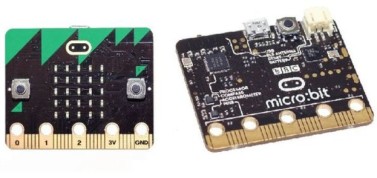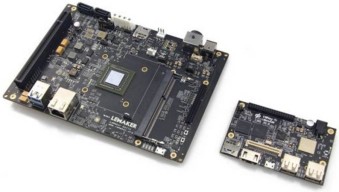A Short History of Rapid Prototyping Platforms
BBC micro:bit
After Earth, Air, Water, and Fire, Software has become the fifth element of life. Unlike the first four elements, software is the result of hard human labour, produced by millions of fingers hammering away on grotty computer keyboards. In the UK, in a bid to secure enough brainpower for tomorrow’s software needs, the British Broadcasting Company (BBC) decided to mine the UK’s 11- and 12-year-olds by giving every kid a BBC micro:bit microcontroller development board for free. The board is supported by free online programming tools intended to make getting into software development easy & fun. For the BBC the campaign ended once the million boards were in the schoolgirls and boys little hands, which was in the spring of 2016. A few months later the BBC micro:bit was made available to the rest of the world.
The BBC micro:bit is a little 32-bit battery-powered board with Bluetooth making it suitable for mobile applications. It is also fully mbed-enabled, meaning that it can be programmed and debugged with professional tools. Lancaster University created a beautiful library for the board allowing easy access to the board’s functions. Its MicroPython capabilities are another important asset.
Other countries have followed the BBC campaign with much interest and decided to start similar projects. The Calliope Mini board from Germany may be the first in a long line of BBC micro:bit inspired clones with the objective to make programming even more easy than Arduino did.
96Boards
On June 3, 2010 Linaro was presented to the world by its proud parents ARM, Freescale, IBM, Samsung, ST-Ericsson and Texas Instruments. The newly-born not-for-profit company is committed to providing new resources and industry alignment for open source software developers using Linux on System-on-Chips (SoCs). Linaro has been an active contributor to Linux ever since and many other large companies have joined the initiative.Clearly inspired by the success of the Raspberry Pi, Linaro set out to develop an open hardware specification for 32- and 64-bit ARM platforms which resulted in the 96Boards initiative launched at the beginning of 2015. It is probably no coincidence that the 96Boards Consumer Edition (CE) has the exact same dimensions as the Raspberry Pi 2. The hardware specification however makes all the difference: 96Boards-compliant boards can be used in mass-produced products, unlike the ad-hoc designs of other popular boards (except maybe for the almost forgotten Raspberry Pi Compute Module) with connectors on every side where there was room.

Currently there are three 96Boards specification Editions: Enterprise (EE), Consumer (CE) and IoT (IE) and the first compliant boards are starting to appear like the LeMaker Cello ARM 64-bit Sever Main Board or the DragonBoard 410c featuring Quallcomm’s first long-life Snapdragon 410E processor. A 96Boards IE sure would make a great Elektor project, we are working on it.
Read full article
Hide full article



Discussion (0 comments)